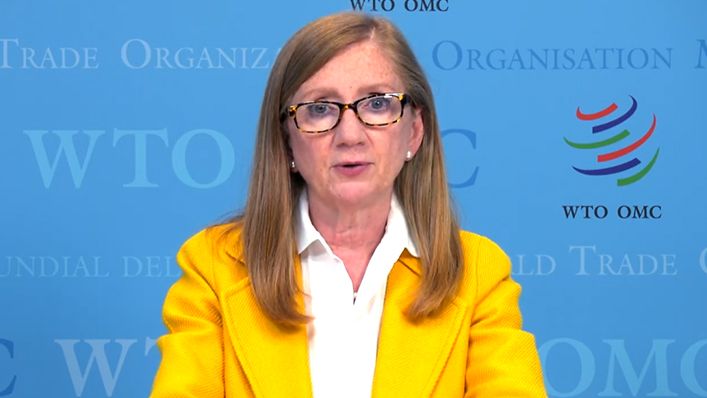Anabel González, Deputy Director General of the World Trade Organization (WTO), outlined five highlights of the WTO agenda for 2022.
The reflection of her occurs after the Covid-19 pandemic caused the suspension of the 12th Ministerial Conference in 2021. The following are her views disseminated through her blog at the WTO.
First of all, 2022 should be the year in which WTO members give a trade and health response to the pandemic, including on intellectual property issues.
The medical product trade proved to be a lifesaver for people around the world in 2021, but more is needed.
According to González, a robust framework that facilitates trade in vaccines and critical medical equipment and the supplies needed for their production would go a long way toward saving lives, supporting a more widespread recovery, and helping prepare for the future with increased manufacturing capacity and diversified in all regions.
«This agreement is not only feasible, it’s within reach early in the year,» she said.
WTO Agenda
Second, with the adoption of several ministerial declarations in December 2021, governments directed the WTO to strengthen the role of trade rules in effectively fighting climate change and supporting environmental goals, including exploring the work in areas such as trade in environmental goods and services, sustainable trade in plastics, and fossil fuel subsidies, among others.
Work in 2022 could lay the groundwork for launching plurilateral negotiations in some of these areas.
Furthermore, and as soon as possible in the New Year, WTO members should conclude the negotiation of a long-overdue deal to cut harmful fisheries subsidies.
From their perspective, doing so would send a strong signal of their commitment to a green trade agenda and their ability to negotiate multilaterally.
Third, based on a very productive year in 2021 and as part of the WTO agenda, more than two-thirds of the Members participating in the negotiations on investment facilitation for development have set the aim of concluding an agreement in 2022 with the aim of helping countries improve their business climate and make it easier for investors to invest, manage their businesses and expand their operations.
Success would help harness the power of foreign investment for a strong and sustainable recovery.
Similarly, she added, advancing significant progress in the plurilateral negotiations on e-commerce could help small and medium-sized enterprises in all countries, from Senegal to Ecuador to Vietnam and beyond, to reap the benefits of participating in the trade. international trade, backed by a single set of rules and with reduced trade costs.
Subsidies
Fourth, concerns about rising levels of government support distorting international markets, coupled with limited transparency and perceptions of injustice, erode public support for open trade and stifle innovation, competition, and productivity.
González stressed that it is increasingly recognized that reviewing and updating WTO rules related to subsidies and state intervention in the economy would help reduce some of the trade frictions that are fueling uncertainty and geopolitical tensions.
Fiscal and financial considerations add to the justification for tightening disciplines and controlling budget outlays, in both the industrial and agricultural sectors.
«2022 is the year for WTO members to conceptually frame the issue and structure a discussion leading to revised rules and commitments in this area» she commented.
Finally, as part of the WTO agenda, it is difficult to get into the rule-making business without a fully operational dispute settlement system.
The rules are only as good as they are applied, so it is essential to restore a binding mechanism to resolve disputes between WTO members.
It is a difficult subject, no doubt, and perhaps it is related to other points.
Regardless of the shortcomings of the WTO dispute settlement system, it is important to note that the system has helped resolve many trade disputes and governments have mostly complied with its rulings.
All WTO members, even the most powerful among them, are better off with the system than without it. And if change is needed, whatever that may be, 2022 is the right time to seriously engage in that dialogue.
![]()

